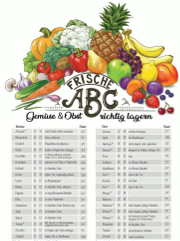Rule of thumb for storing vegetables
Every type of vegetable feels most comfortable in the climate in which it was grown. This means that heat-loving vegetables such as peppers or eggplants are better stored at room temperature than in the refrigerator. Potatoes and cabbage love it cool and dark, which is why they are in good hands in a storage cellar. You can safely put salads or asparagus in the refrigerator to achieve the longest possible shelf life.
also read
- Store bread optimally - it will still taste good tomorrow
- Store cucumbers correctly - where the green vegetables feel good
- Storing broccoli - this is how you store the vitamin-rich vegetables correctly
Vegetables that are well stored in the refrigerator
Vegetables that can withstand cold temperatures and are not affected by high humidity belong in the refrigerator. The refrigerator is the right place, especially for short-term storage of various types of vegetables. Vegetables with a high water content, however, do not tolerate the cold well and lose their taste in the refrigerator.
The refrigerator is the best storage location for:
- Leafy vegetables (salads, spinach, chard)
- peas
- Corn
- artichokes
- leek
- mushrooms
- asparagus
Vegetables for which a storage cellar is ideal
Tuber vegetables in particular can be stored well in a cool storage cellar. The vegetables are more airy in the cellar than in the vegetable drawer, which is why they are less prone to mold. Starchy vegetables, especially potatoes, like it cool, but not cold, as otherwise they convert their starch into sugar and taste unpleasant.
You can easily store the following varieties in the cellar:
- celery
- Kohlrabi
- potatoes
- Pumpkins
- Sweet potatoes
- Cabbage vegetables (hung upside down on the intact stalk)
- Root vegetables (in boxes with damp sand)
Vegetables that can tolerate room temperature
Airy storage at moderate temperatures is suitable for many types of vegetables that are in high season in summer and have a high water content. When it is cold, they lose their aroma. When storing it in the kitchen, it is important to have a shady place without the influence of heat, for example not directly at the window or next to electrical appliances. Vegetables stored at room temperature should be eaten soon, as they have a shorter shelf life than varieties stored in the refrigerator.
You can store the following varieties at room temperature:
- Eggplant
- zucchini
- tomatoes
- paprika
- Cucumber
- Avocados
- green beans

The garden journal freshness-ABC
How can fruit & vegetables be stored correctly so that they stay fresh as long as possible?
The garden journal freshness ABC as a poster:
- as free PDF file to print out on your own


